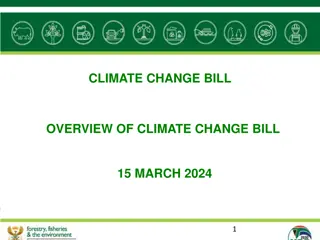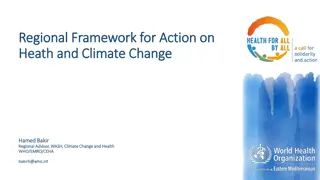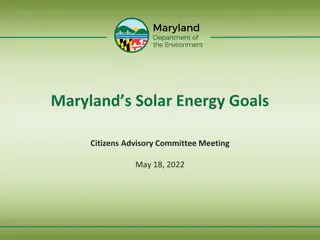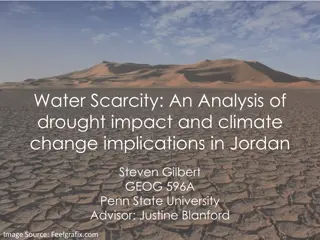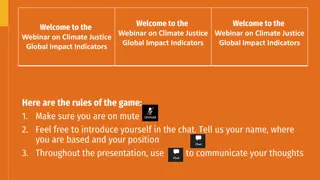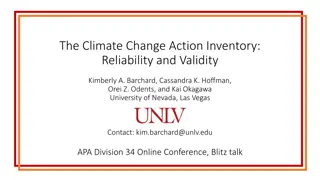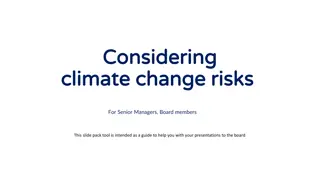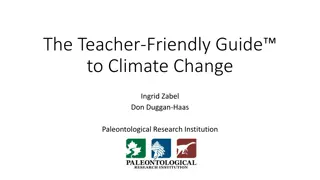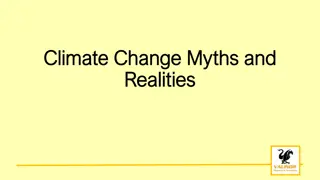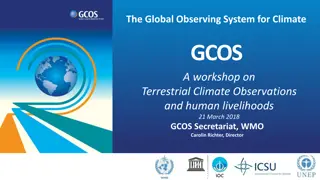Understanding Climate Change and Community Responses
Climate change refers to significant variations in the Earth's climate due to increased greenhouse gas emissions, leading to the greenhouse effect. This has resulted in various impacts such as extreme weather events and threatens sectors like water resources, agriculture, and biodiversity. Addressing climate change requires community support and participation through measures like adaptation and resilience building.
Download Presentation

Please find below an Image/Link to download the presentation.
The content on the website is provided AS IS for your information and personal use only. It may not be sold, licensed, or shared on other websites without obtaining consent from the author. Download presentation by click this link. If you encounter any issues during the download, it is possible that the publisher has removed the file from their server.
E N D
Presentation Transcript
Adaptation and responds to climate change and the participation on Paris Agreement (COP21). Tumiar katarina manik
What is Climate change? Climate Change is defined as statistically significant variation in either mean state of the climate or in its variability, persisting for an extended period, typically decades or longer
How Climate change happened Rising fossil fuel burning and land use changes have emitted, and are continuing to emit, increasing quantities of greenhouse gases into the Earth s atmosphere. These greenhouse gases include carbon dioxide (CO2), methane (CH4) and nitrogen dioxide (N2O), and a rise in these gases has caused a rise in the amount of heat from the sun withheld in the Earth s atmosphere, heat that would normally be radiated back into space.
This increase in heat has led to the greenhouse effect, resulting in climate change and are expected to affect many aspects of human activities including tropical cyclones (hurricanes and typhoons), floods, droughts and heavy precipitation events
The Impacts of Climate change Climate change could severely exacerbate the impact of natural hazards, disaster and extreme weather and will have wide-ranging effects on the environment, and on socio-economic and related sectors, including water resources, agriculture and food security, human health, terrestrial ecosystems and biodiversity and coastal zones. Therefore, effective responses to climate change require at least community support and, ideally, genuine community participation.
concepts in qualifying communities response to climate change Vulnerability is the degree to which a system is susceptible to, or unable to cope with, adverse effects of climate change Adaptation is initiatives and measures to reduce the vulnerability of natural and human systems against actual or expected climate change effects.
Resilience is the ability of a social or ecological system to absorb disturbances while retaining the same basic structure and ways of functioning, the capacity for self- organization, and the capacity to adapt to stress and change adaptation is a process through which societies make themselves better able to cope with an uncertain future
Concept of Nations participation (Mitigation) The Paris Agreement (COP 21) On 12 December 2015, 196 Parties to the UN Framework Convention on Climate Change (UNFCCC) adopted the Paris Agreement, a new legally-binding framework for an internationally coordinated effort to tackle climate change. The Agreement establishes a global warming goal of well below 2 C on pre-industrial averages
The Paris Agreement defines a universal, legal framework to strengthen the global response to the threat of climate change The Paris Agreement puts emphasis on processes rather than on defined mitigation goals The Paris Agreement recognizes the different starting points and responsibilities of countries
Why should any country ratifies Paris agreement? in order to have a voice and get involved in deciding the mechanisms and utilities in implementing The Paris Agreement to ensure that mitigation and adaptation actions would be seriously conducted and insert the plans into the National Development Plans to apply the whole transparation and accountabilities rules through the MRV (measured, reported and verified) instruments in conducting mitigation and adaptation actions, utilization of the supporting funds, technologies, and capacity buildings both for government agencies and the NGOs









